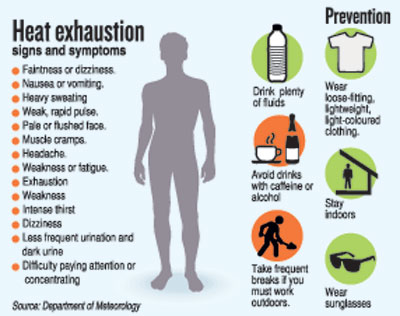News
Alert level rises with the heat
For the first time, the Meteorology Department and Health Ministry will issue a joint daily heat advisory due to the higher temperatures all over the country.
Meteorology Department Director (Forecasting) Anusha Warnasooriya said hot and humid days will continue until the end of May and the onset of the south-west monsoon.
“The highest temperatures these days are about 35 degrees [95F] but if there are no cloud formations and no winds there is a possibility of temperatures increasing up to 38 degrees [100.4F],” she said.
The prevailing inter-monsoon season until the end of May is characterised by high daytime temperatures and thunderstorms and scattered showers at night.
“We decided to issue a warm weather advisory from the beginning of May as the public should be aware of which areas will experience hot and humid weather and what precautions need to be taken,” Ms. Warnasooriya said.
School authorities should avoid exposing schoolchildren to the outdoors until the hot weather eases and everyone should make sure they drink water if outdoors for long periods, especially from morning to noon, Ms. Warnasooriya advised.
When the ground surface heats up, excessive evaporation causes humidity in the atmosphere which causes people to sweat. As there is less wind/ dryness in the atmosphere the sweat does not evaporate, causing physical discomfort, Ms. Warnasooriya explained.
Last week, 14 soldiers attached to an army training school in Vavuniya who were on daily training sessions outdoors were admitted to Vavuniya District General Hospital following symptoms of heat stroke.
Vavuniya General Hospital Director Dr. K. Akilendran said the soldiers were rushed to the hospital at about 12.30 p.m. with hyperthermia (increase in body temperature) due to being exposed to the hot sun for a long time. The soldiers had become dehydrated and dizzy, with three of them in serious condition due to a drop in blood glucose levels.
Dr. Akilendran said the soldiers were placed in a cool space and given saline and glucose.
With the sun directly above Sri Lanka and a drop in wind currents, temperatures of 35-36C are being reported in the north, north-central and north-western regions. Polonnaruwa, Vavuniya, Jaffna and Mannar recorded temperatures of more than 35C last week, the Meteorology Department said.
Although the average temperature for Colombo in April is 30.8C [87.4F], last week 32.C [89.6F] was reported. Anuradhapura’s temperature increased from the average 34.3C to 35.3C. Vavuniya too saw an increase from 34.4C to 35.2C. Jaffna experienced an increase of 2.2C from the average 32.7C to 34.9C. Galle saw an increase from 30.6C to 31.4C degrees while Kandy was up from the average 31C to 32C.
Some relief is being forecast during Vesak week, with scattered showers and thundershowers expected in the Western and Sabaragamuwa provinces as well as Galle and Matara districts after 2pm.
Excessive heat could give rise to loss of appetite, increased thirst, skin rashes, depression, lack of sleep, physical discomfort caused by humidity, dehydration and aggravated migraine headaches, medical professionals warn.
Health Ministry’s Nutrition Coordination Division Director Dr. Rasanjali Hettiarachchi advised people to increase their water intake from eight glasses a day to at least 12 glasses and to consume other fluids such as coconut, king coconut water, oral rehydration salts (jeevani) in case of symptoms of dehydration, and fresh juices.
“Excessive sweating results in the body losing electrolytes. Children and the elderly are more vulnerable to dehydration,” she said, recommending citrus juices such as orange, lime and lemon which are high in electrolytes.
People should wear sunglasses while outdoors to avoid eye exposure to direct sunlight and heat-induced headaches, Dr. Hettiarachchi said. She encouraged loose cotton clothes as much as possible, especially for children who often suffer from miliaria (prickly heat/ sweat rash) in warm weather.
| Thunderstorm warning | |
| The Meteorology Department has issued a severe thunderstorm warning for the Western, Sabaragamuwa, Central, North-Western and Uva provinces as well as Galle, Matara, Vavuniya, and Killinochichi districts, especially in the evenings. The thunderstorms will be accompanied by severe lightning and thunder. The advisory states:
Last week, two tea pluckers were admitted to Dikoya hospital after being struck by lightning while working. In Dambulla, a man and his wife died from lightning while attempting to pluck coconuts using an iron rod. In Aralaganwila, a 72-year-old man died when, during a thunderstorm, he touched a wire used for a well. A house was damaged in Ramboda, Kotmale and five people were injured after lightning struck a nearby tree, while in Kirindiwela a house caught fire following a lightning strike. |

